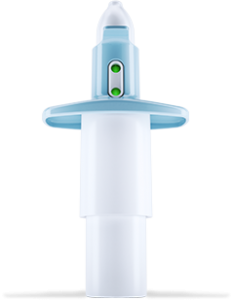Prescription nasal spray for treatment-resistant depression
There are some patients whose depressive symptoms remain severe, despite trying numerous antidepressant medications and engaging in psychological therapies. Such patients are often diagnosed with treatment-resistant depression.
At Nightingale Hospital, we offer a choice of three distinct and highly specialised treatments for the management of treatment-resistant depression. These include repetitive transcranial magnetic stimulation (rTMS), electroconvulsive therapy (ECT) and a new prescription nasal spray, and all have been proven to be clinically effective for treatment-resistant depression.
We are the first and only private hospital to offer this new prescription nasal spray for patients with treatment-resistant depression.
What is a prescription nasal spray for treatment-resistant depression?
 This spray is used, in conjunction with an oral antidepressant, to treat adults with treatment-resistant depression.
This spray is used, in conjunction with an oral antidepressant, to treat adults with treatment-resistant depression.
The decision to prescribe the spray is determined by a consultant psychiatrist, and patients wishing to access this treatment must be under the care of a Nightingale Hospital consultant psychiatrist, for the duration of treatment.
This treatment can be accessed on an outpatient or inpatient basis.
How is this new treatment administered at Nightingale Hospital?
At Nightingale Hospital, this new treatment is administered in the form of a prescription nasal spray.
Throughout each treatment session, patients will be under the careful guidance and monitoring of Nightingale Hospital’s nursing staff. They will be shown how to use the nasal spray device and under supervision, will administer the spray themselves.
The treatment dosage will be prescribed by the treating consultant psychiatrist. How many sprays patients administer into each nostril, and how many times they do this, will be dependent on their individual prescription.
There are two ‘phases’ within this prescription nasal spray treatment cycle
- The first is an induction phase where the patient will receive two treatments per week, for four weeks
- The next phase is the maintenance phase, where the frequency of treatment will be reduced to once weekly or once fortnightly, depending on the individual
During this time, the patient will continue to take an oral antidepressant as prescribed.
The health care practitioner supervising treatment sessions will be able to answer any questions patients may have during appointments. If a patient misses a treatment session, the consultant psychiatrist may change the dose and treatment schedule.
How does this nasal spray work?
This product helps treat depressive symptoms by targeting numerous neural receptors in the brain. Working differently from the most commonly used oral anti-depressants, it specifically targets the N-methyl-D-aspartate (NMDA) receptor.
The treatment has been clinically proven to help patients suffering from treatment-resistant depression by:
- Stabilising mood
- Decreasing the severity of depression
- Delaying the return of symptoms
- Reducing suicidal thoughts
- Taking more rapid effect than other treatments for depression
Is the prescription nasal spray safe?
This product has been subject to various clinical trials undertaken with adults with treatment-resistant depression. It was licensed in the UK for use in late 2019, as well as approved in the USA by the Food and Drug Administration (FDA) for use in early 2019.
Before accessing treatment, the treating consultant psychiatrist will take a thorough clinical history from patients to establish any concerns around addiction. Individuals with a history of drug abuse or dependence are at greater risk when being prescribed this treatment.
If someone is identified as belonging to a high-risk group, both the consultant and patient will need to carefully study the risks and benefits of treatment before deciding upon treatment.
Is it effective for those with treatment-resistant depression?
A clinical study was undertaken to compare the reduction of depressive symptoms in two groups of patients. One group received a combined treatment of an oral anti-depressant and the spray, and the other an oral anti-depressant only. The patient group which received the combined treatment experienced a reduction in their depressive symptoms in four weeks.* Source
Eligibility criteria for this treatment at Nightingale Hospital
To be eligible for this treatment at Nightingale Hospital, patients must meet the following criteria:
- Be currently suffering from treatment-resistant depression
- Have tried at least two different types of antidepressants for at least six weeks each, both at an adequate treatment dose
- Have tried at least one type of psychological therapy
- Be at least 18-years of age or above
However, the decision to prescribe this medication is determined by a consultant psychiatrist and may depend on different factors.
When is this treatment not suitable?
This treatment is contraindicated in patients who:
- Have aneurysmal vascular disease (including thoracic and abdominal aorta, intracranial, and peripheral arterial vessels) or arteriovenous malformation
- Have a history of intracerebral haemorrhage
- Have hypersensitivity to esketamine, ketamine, or any of the excipients
- Are pregnant, breastfeeding, undergoing IVF or trying to conceive
Additionally, there are other physical and psychological factors that might lead a consultant psychiatrist to deem a patient unsuitable to receive treatment.
Individuals with a history of addiction are at greater risk when being prescribed this medication. Because of this, the treating psychiatrist will take a thorough clinical history of patients to establish any concerns, and carefully study the risks and benefits before advising about treatment.
Detailed information about this can be obtained by contacting us using the form below.
What are the side effects of treatment?
Like all medicines, this treatment can cause side effects, although not everybody experiences them. Listed below are some common side effects of this medication.
Please note the list of side effects below is not exhaustive.
- Disassociation, meaning feeling disconnected from yourself, your thoughts, feelings and things around you
- Feeling dizzy
- Headaches
- Change in sense of taste
- Feeling sleepy
- Decreased feeling or sensitivity, including around the mouth area
- Spinning sensation (vertigo)
- Vomiting (throwing up)
- Nausea (feeling and wanting to be sick)
Serious side effects include: Increased risk of suicidal thoughts and behaviour, increased blood pressure, problems with thinking clearly and bladder problems. If patients have concerns about side effects before, during or after their experience, these should be discussed with the treating consultant psychiatrist or the health care professional leading your session.
How much does this nasal spray treatment cost at Nightingale Hospital?
The cost of this treatment at Nightingale Hospital will vary depending on individual circumstances. For more detailed information about the cost of treatment, please contact us using the form at the bottom of this page.
Most private medical insurers review applications to fund this new treatment on a case-by-case basis. Please contact your insurance provider to assess your eligibility. The hospital requires an insurer’s authorisation before treatment can commence.
Accessing nasal spray for treatment-resistant depression at Nightingale Hospital
Individuals can self-refer themselves to Nightingale Hospital for nasal spray treatment. Additionally, GPs and other health professionals can refer patients.
Patients need to be under the care of a Nightingale Hospital consultant psychiatrist for the duration of treatment.
Why choose Nightingale Hospital for this new treatment?
- Our treatment service is led by renowned UK consultant psychiatrist, Dr Christopher Muller-Pollard
- Nightingale Hospital has many years of experience in delivering innovative, effective and safe specialised treatments for treatment-resistant depression
- We were the first private hospital in the UK to introduce repetitive transcranial magnetic stimulation (rTMS), and have a long partnership with the NHS to deliver electroconvulsive therapy (ECT).
- We are the first and only private hospital to offer this nasal spray treatment for patients with treatment-resistant depression
- A hospital setting means we have access to a full medical team on site
- We have devised extensive treatment protocols, to provide maximum patient safety, and all staff involved in the service have received comprehensive training
- We have a dedicated nasal spray treatment room, designed specifically for patients
If you would like more information about this new prescription nasal spray for treatment-resistant depression, please complete the form below. A member of our team will respond to your enquiry within two business days.







